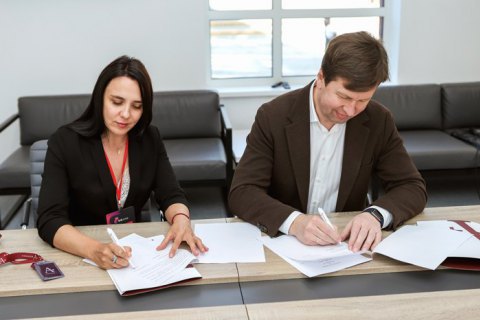An experimental educational platform is planned to be established in Kyiv to teach school children the basics of coding. The project is being developed with a view to including it in the existing IT curriculum by the working guideline development group of Gymnasium A+ with the support of the EVEREST group of companies, a leading integrator of innovative technology in Ukraine.
As part of this initiative, the sides signed a memorandum of cooperation at the Mini-EdCamp conference on "Raising and educating children in the DIGIT@L era" on 24 March.
The project team includes teachers and specialists in coding and ICT who will examine and test the best world practices and priority methods of teaching coding for children, analyse and work out the mechanisms for their effective inclusion in the ICT curriculum, as well as adapt necessary technological solutions to other educational institutions, with a view to introducing coding for children in the short run. In addition, the team will focus on organizing practical training and support for teachers in order to adapt them to the innovations.
Early coding lessons offer a whole range of advantages both for students and teachers. This was one of the issues on the agenda of a separate presentation on "Early school coding" at the Mini-EdCamp conference on 24 March.
"Children are full-fledged consumers of technological innovations today. Their relevance to the job market in the future will depend on how well they understand the principle of their work. Early coding is not entertainment, it is a conscious and effective way to acquire key basic skills in life focusing on the capabilities of information systems and software," EVEREST Group of Companies President Yuriy Chubatyuk said.
He pointed out that the signing of a memorandum of cooperation with Gymnasium A+ with a view to implementing the project on early coding for children is a crucial step towards progress in education: "We are responsible for the future of our children and therefore we should clearly understand that without such innovations, without appropriate skills and knowledge, it will be extremely difficult for them to adapt to the current global digital world," he concluded.
China, the USA, Canada, Singapore, Australia, Israel, India, South Korea and most of EU member states have already included coding basics in their school curricula. The ICT curricula in Bulgaria, the Czech Republic, Denmark, Estonia, Greece, Ireland, Italy, Lithuania, Poland, Portugal and the UK were expanded to include coding in 2014. Seven more EU states are planning to follow suit by 2020.
The National Department of Basic Education of the Republic of South Africa has developed a "framework of skills for a changing world". In particular, it plans to introduce coding curricula in all school classes starting from Grade R.
Eastern European countries also consider early coding important. The British Council has developed a three-year computer coding learning programme for the Balkan countries, including Albania, Bosnia and Herzegovina, Kosovo, Montenegro, Northern Macedonia and Serbia.
According to Chubatyuk, international experience shows that coding for children is no longer a trend but a necessity because it directly affects modern children's ability to fulfill their potential: "And this is not just an additional acquired skill but a whole set of priority advantages that reflects on how students build their careers," he added.








